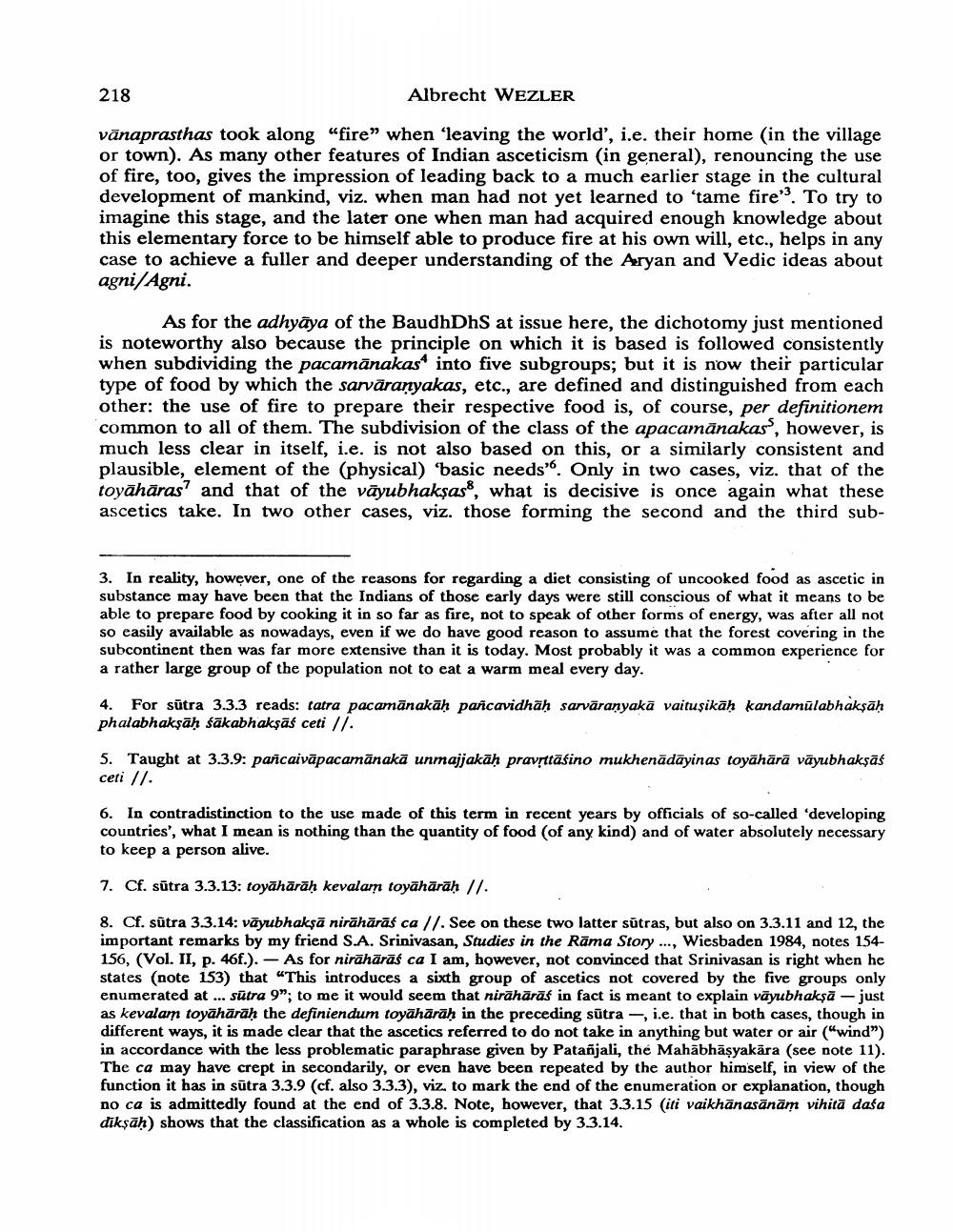Book Title: Note On Class Of Ascetics Called Unmajjaka Author(s): A Wezler Publisher: A Wezler View full book textPage 2
________________ 218 Albrecht WEZLER vānaprasthas took along "fire" when leaving the world', i.e. their home in the village or town). As many other features of Indian asceticism (in general), renouncing the use of fire, too, gives the impression of leading back to a much earlier stage in the cultural development of mankind, viz. when man had not yet learned to 'tame fire". To try to imagine this stage, and the later one when man had acquired enough knowledge about this elementary force to be himself able to produce fire at his own will, etc., helps in any case to achieve a fuller and deeper understanding of the Aryan and Vedic ideas about agni Agni. As for the adhyāya of the BaudhDhS at issue here, the dichotomy just mentioned is noteworthy also because the principle on which it is based is followed consistently when subdividing the pacamānakas into five subgroups; but it is now their particular type of food by which the sarvāranyakas, etc., are defined and distinguished from each other: the use of fire to prepare their respective food is, of course, per definitionem common to all of them. The subdivision of the class of the apacamānakas, however, is much less clear in itself, i.e. is not also based on this, or a similarly consistent and plausible, element of the (physical) 'basic needs. Only in two cases, viz. that of the toyāhāras" and that of the vāyubhakşas, what is decisive is once again what these ascetics take. In two other cases, viz. those forming the second and the third sub 3. In reality, however, one of the reasons for regarding a diet consisting of uncooked food as ascetic in substance may have been that the Indians of those early days were still conscious of what it means to be able to prepare food by cooking it in so far as fire, not to speak of other forms of energy, was after all not so easily available as nowadays, even if we do have good reason to assume that the forest covering in the subcontinent then was far more extensive than it is today. Most probably it was a common experience for a rather large group of the population not to eat a warm meal every day. 4. For sūtra 3.3.3 reads: tatra pacamānakāḥ pancavidhāḥ sarvaranyakā vaitusikāḥ kandamūlabhaksāh phalabhaksā, sākabhakşās ceti //. 5. Taught at 3.3.9: parcaivāpacamānakā unmajjakāḥ pravíttāśino mukhenādāyinas toyāhārā vāyubhakşās ceti //. 6. In contradistinction to the use made of this term in recent years by officials of so-called 'developing countries', what I mean is nothing than the quantity of food (of any kind) and of water absolutely necessary to keep a person alive. 7. Cf. sūtra 3.3.13: toyāhārāḥ kevalam toyāhārāh //. 8. Cf. sutra 3.3.14: vāyubhaksā nirāhārāś ca //. See on these two latter sūtras, but also on 3.3.11 and 12, the important remarks by my friend S.A. Srinivasan, Studies in the Rāma Story ..., Wiesbaden 1984, notes 154156, (Vol. II, p. 46f.). - As for nirāhārāś ca I am, however, not convinced that Srinivasan is right when he states (oote 153) that “This introduces a sixth group of ascetics not covered by the five groups only enumerated at ... sutra 9"; to me it would seem that nirāhārās in fact is meant to explain väyubhaksā - just as kevalar toyāhārāh the definiendum toyāhārāḥ in the preceding sutra -, i.e. that in both cases, though in different ways, it is made clear that the ascetics referred to do not take in anything but water or air (“wind") in accordance with the less problematic paraphrase given by Patañjali, the Mahābhāşyakara (see note 11). The ca may have crept in secondarily, or even have been repeated by the author himself, in view of the function it has in sūtra 3.3.9 (cf. also 3.3.3), viz. to mark the end of the enumeration or explanation, though no ca is admittedly found at the end of 3.3.8. Note, however, that 3.3.15 (iti vaikhānasānām vihitā daśa dikşāh) shows that the classification as a whole is completed by 3.3.14.Page Navigation
1 2 3 4 5 6 7 8 9 10 11 12 13 14 15 16 17 18 19 20 21 22 ... 27
